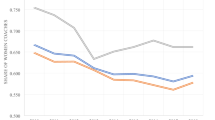Abstract
This study aimed to update previous homologous reproduction research in coaching for four NCAA women’s collegiate teams in the USA. Further, this study aimed to extend previous research by continuing to examine environments in which women (as a proportion) are actually the dominant gender doing the hiring of their subordinate employees. Specifically, we examined the gender representation of assistant coaches as a function of the gender of their head coach in four sports (women’s basketball, women’s soccer, women’s volleyball, and softball) across all three NCAA divisions (I, II, and III). Results for this study revealed that in three of the four sports analyzed, female head coaches continue to hire female assistant coaches at a higher rate overall than do male head coaches. Further, male head coaches have continued to decrease their homologous reproductive practices since 2002 and have begun hiring additional female assistants and fewer all male coaching staffs.
Similar content being viewed by others
Notes
Data obtained through the EADA database: http://ope.ed.gov/athletics/.
References
Acosta, R. V., & Carpenter, L. J. (2012). Women in intercollegiate sport. A longitudinal, national study, thirty five year update 1977–2012. http://www.acostacarpenter.org/
Acosta, R. V., & Carpenter, L. J. (2014). Women in intercollegiate sport. A longitudinal, national study, thirty seven year update 1977–2014. http://www.acostacarpenter.org/
Aicher, T. J., & Sagas, M. (2010). Are head coaches in intercollegiate athletics perceived as masculine? An evaluation of gender stereotypes and the effect of sexism on intercollegiate coaches. Gender Issues, 27(3–4), 165–174.
Burton, L. J. (2015). Underrepresentation of women in sport leadership: A review of research. Sport Management Review, 18(2), 155–165.
Burton, L. J., Grappendorf, H., & Henderson, A. (2011). Perceptions of gender in athletic administration: Utilizing role congruity to examine (potential) prejudice against women. Journal of Sport Management, 25, 36–45.
Cunningham, G. B., & Sagas, M. (2008). Gender and sex diversity in sport organizations: Introduction to a special issue. Sex Roles, 58(1–2), 3–9.
Cunningham, G. B. (2009). The moderating effect of diversity strategy on the relationship between racial diversity and organizational performance. Journal of Applied Social Psychology, 39(6), 1445–1460.
Kanter, R. M. (1977). Men and women of the corporation. New York: Basic Books.
Knoppers, A. (1987). Gender and the coaching profession. Quest, 39(1), 9–22.
Lovett, D. J., & Lowry, C. (1994). “Good old boys” and “good old girls” clubs: Myth or reality. Journal of Sport Management, 8, 27–35.
Sagas, M., & Cunningham, G. B. (2004). Does having the right stuff matter? Gender differences in the determinants of career success among intercollegiate athletic administrators. Sex Roles, 50(5), 411–421.
Sagas, M., Cunningham, G. B., & Teed, K. (2006). An examination of homologous reproduction in the representation of assistant coaches of women’s teams. Sex Roles, 55, 503–510.
Sartore, M. L., & Cunningham, G. B. (2007). Explaining the underrepresentation of women in leadership positions of sport organizations: A symbolic interactionist perspective. Quest, 59, 244–265.
Shaw, S., & Hoeber, L. (2003). A strong man is direct and a direct woman is a bitch: Gendered discourses and their influence on employment roles in sport organizations. Journal of Sport Management, 17(4), 347–375.
Stangl, J. M., & Kane, M. J. (1991). Structural variables that offer explanatory power for the underrepresentation of women coaches since title IX: The case of homologous reproduction. Sociology of Sport Journal, 8, 47–60.
United States Department of Education. (2000–2001). Equity in athletics disclosure website. Retrieved Oct 20, 2014. http://ope.ed.gov/athletics/
Veal, A. J., & Darcy, S. (2014). Research methods in sport studies and sport management: A practical guide. Abingdon: Routledge.
Walker, N., & Sartore-Baldwin, M. (2013). Hegemonic masculinity and the institutionalized bias toward women in men’s collegiate basketball: What do men think? Journal of Sport Management, 27, 303–315.
Whisenant, W. A. (2008). Sustaining male dominance in interscholastic athletics: A case of homologous reproduction… or not? Sex Roles, 58(11–12), 768–775.
Whisenant, W. A., & Mullane, S. P. (2007). Sport information directors and homologous reproduction. International Journal of Sport Management and Marketing, 2(3), 252–263.
Whisenant, W. A., Pedersen, P. M., & Obenour, B. L. (2002). Success and gender: Determining the rate of advancement for intercollegiate athletic directors. Sex Roles, 47(9/10), 485–491.
Author information
Authors and Affiliations
Corresponding author
Rights and permissions
About this article
Cite this article
Darvin, L., Sagas, M. An Examination of Homologous Reproduction in the Representation of Assistant Coaches of Women’s Teams: A 10-Year Update. Gend. Issues 34, 171–185 (2017). https://doi.org/10.1007/s12147-016-9169-2
Published:
Issue Date:
DOI: https://doi.org/10.1007/s12147-016-9169-2



